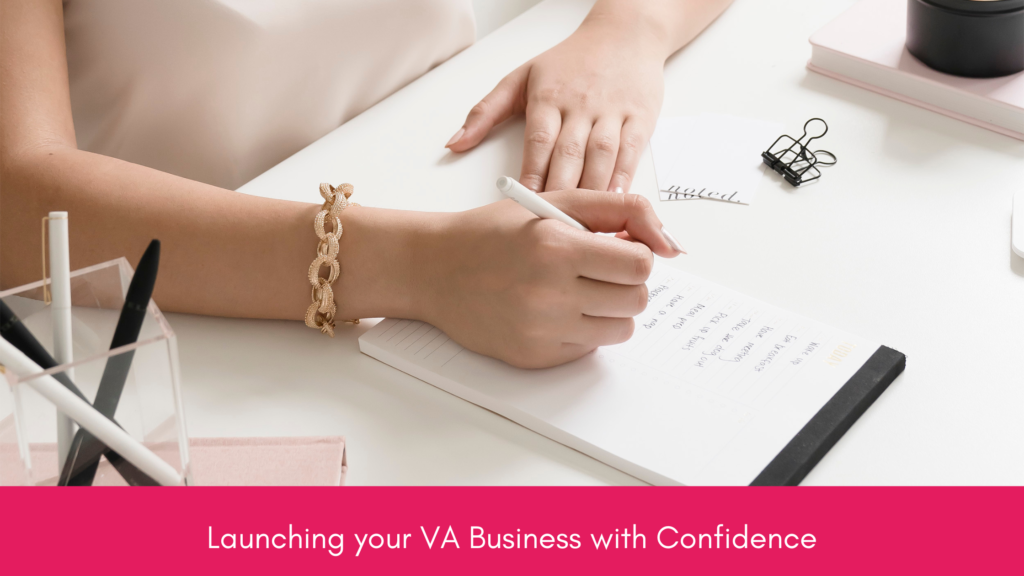For over 16 years, VACT Limited has helped thousands of virtual assistants (VAs) launch successful businesses. We know that new VAs—whether they’re coming from a PA background or starting a new career—have a lot of questions. This post recaps the most common questions and provides clear answers to help you get started.

What tools and equipment do I need to get started?
The good news is that you don’t need much to get started, which keeps your overheads low and helps you turn a profit quickly.
The Essentials:
A computer
A dedicated phone line (landline or mobile)
- Internet
- Insurance
- Contracts
- Domain specific email address (the website itself can come in time)
Tools to Make Life Easier:
Video conferencing software like Zoom, Microsoft Teams or Google Meet.
Time tracking software check out our blog that shares 7 of the most popular.
Accounting software
A file-sharing program such as Dropbox or Google Docs
What business model should I use?
There’s no single “right” answer here—it depends on what’s best for you. Your two main options are becoming a sole trader or a limited company.
Sole Trader: This is the simpler option. You just need to register with HMRC and sign up for self-assessment tax and National Insurance.
Limited Company: This is more complex, but it separates your business affairs from your personal finances. This means your personal assets are protected if your business gets into debt.
What insurance do I need?
Having the right insurance is crucial. It protects your business, your reputation, and gives your clients peace of mind. Before you work with any client, you must have both Professional Indemnity and Public Liability insurance. We have a series of blogs on insurance that you might want to read.
We’ve partnered with professional insurance broker PolicyBee to offer our community a 10% discount on professional indemnity insurance. For a quick quote, visit policybee.co.uk/VACT or call their advisors at 0345 222 5370. You can also read more about this in our guest blog post from PolicyBee.
Registering with the ICO
If you collect and store data, you must register with the Information Commissioner’s Office (ICO), unless you are exempt. The registration fee is £52 per year (£47 if paid by direct debit). I highly recommend registering for two reasons: it demonstrates to your clients that you handle data responsibly, and it ensures you are compliant with GDPR. The ICO website has an online test to help you determine if you need to register: ico.org.uk
How much should I charge?
This is one of the most common questions new VAs ask. We can’t tell you exactly what to charge, but we can share what VACT community members typically earn.
Hourly rates generally range from £25 to £40 per hour.
Most VAs offer a sliding scale of charges through packages, retainers, or prepaid hours.
A great way to get a better understanding of rates in your area is to check out the annual survey from the Society of Virtual Assistants. Ultimately, the key is to charge your worth.
How do I find clients?
Clients are the lifeblood of any business, and the key to getting them is building relationships. People work with those they know, like, and trust. Focus on building these connections without being overly pushy or sales-focused. We have many blogs on this topic, but a great place to start is: How to get your first client as a Virtual Assistant.
Ready to Launch Your VA Business?
Starting a new business can feel overwhelming. That’s why we created our VA Momentum course. For £1400, you’ll get everything you need to launch and grow, including:
6 comprehensive modules
Valuable feedback on your submitted work
Monthly training webinars and access to our full back catalog
Support from our private and active Facebook group
- Your contracts to support you when working with clients.
- 12 months access to the VA Membership.
Learn more about the VA Momentum Course and whether it is right for you and your VA business: https://vatrainingacademy.co.uk/services/va-momentum-course/


